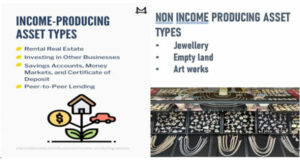 When it comes to investing, it’s important to understand the difference between income-generating assets and non-income-generating assets. Income-generating assets are investments that produce regular income, while non-income-generating assets are investments that do not produce income. In this blog post, we will discuss the differences between these two types of assets and provide examples of each.
When it comes to investing, it’s important to understand the difference between income-generating assets and non-income-generating assets. Income-generating assets are investments that produce regular income, while non-income-generating assets are investments that do not produce income. In this blog post, we will discuss the differences between these two types of assets and provide examples of each.
Income-generating assets
Income-generating assets are investments that produce regular income. These assets can be used to generate passive income, which is income that is earned without active involvement. Some examples of income-generating assets include:
- Rental properties: Rental properties are a popular income-generating asset. By renting out a property, you can earn regular rental income. This income can be used to cover the mortgage, property taxes, and other expenses associated with the property.
- Dividend-paying stocks: Dividend-paying stocks are stocks that pay regular dividends to shareholders. These dividends can provide a regular source of income for investors.
- Bonds: Bonds are debt securities that pay interest to investors. The interest payments can provide a regular source of income for investors.
- Real estate investment trusts (REITs): REITs are companies that own and operate income-generating real estate properties. By investing in a REIT, you can earn regular income from the rental income generated by the properties.
Non-income-generating assets
Non-income-generating assets are investments that do not produce regular income. These assets are typically used for capital appreciation, which is an increase in the value of the asset over time. Some examples of non-income-generating assets include:
- Precious metals: Precious metals such as gold and silver are often used as a store of value. While they do not produce income, they can appreciate in value over time.
- Collectibles: Collectibles such as art, antiques, and rare coins are often used as a store of value. While they do not produce income, they can appreciate in value over time.
- Real estate: Real estate can be both an income-generating asset and a non-income-generating asset. While rental properties can produce regular income, other types of real estate such as vacation homes or undeveloped land do not produce income.
- Cryptocurrencies: Cryptocurrencies such as Bitcoin are often used as a store of value. While they do not produce income, they can appreciate in value over time.
Which type of asset is better?
The answer to this question depends on your investment goals and risk tolerance. Income-generating assets can provide a regular source of income, which can be useful for investors who are looking for passive income. However, these assets may be more volatile than non-income-generating assets, which can make them riskier.
Non-income-generating assets can provide capital appreciation, which can be useful for investors who are looking to build wealth over the long term. However, these assets may be less liquid than income-generating assets, which can make them harder to sell.
Ultimately, the best type of asset for you will depend on your investment goals and risk tolerance. It’s important to do your research and consult with a financial advisor before making any investment decisions.

